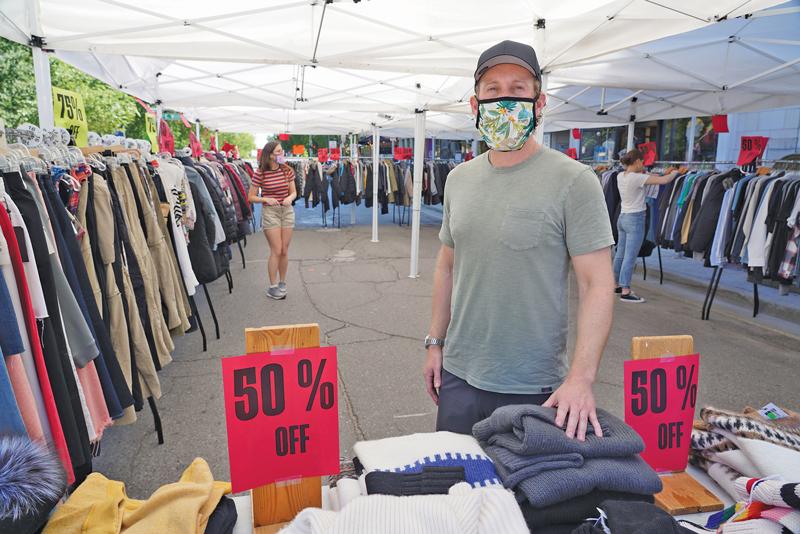What’s it like owning a store in downtown Ann Arbor in the summer of Covid-19?
“This is modern-day wartime,” says AJ Davidson, president of Bivouac on State Street. “You gotta try new things. If you’re not trying to change for the current situation, I don’t think you’re going to survive.”
The clothing and outdoor gear store was requiring customers to wear masks and enforcing social distancing even before Governor Whitmer’s latest executive order in July. “I talked to my dad,” said Davidson, whose father, Ed, founded Bivouac in 1971. “He said, ‘I’ve never seen anything like this before in my lifetime.’
“We count on Art Fair. It saves the summer. [Without it,] it’s a struggle.” And with the return to campus uncertain, “we’re cutting lots of fall orders.”
With social distancing, Bivouac can have no more than forty-two people in the store at a time. They have “hand-sanitizer stations, and plexiglass at all the registers,” says Davidson, and are steam cleaning all the returned items and tried-on clothing. If the fabric can’t be steam cleaned, they’re letting it sit for twenty-four hours. If someone tries on shoes, they spray them with sanitizer afterward.
Bivouac is offering curbside pickup and same-day deliveries within a five-mile radius and has cut the minimum order for free shipping to $29. But sales still “are not great,” says Davidson. “Foot traffic is way down.”
What’s kept them going, he says, is the city’s move to block off streets on weekends for sales and dining. “We have six tents outside the store,” he says. “We’re putting our clearance merchandise out there where people can see the stuff, browse, and come inside. It’s bringing more people into the store. The saving grace is the closing of the streets.”
Elmo Morales, who has been printing and selling T-shirts for forty-three years, isn’t feeling saved. He “had great expectations” when the streets closed, he says. But while he thinks it’s helped the restaurants, it hasn’t helped his hole-in-the-wall shop on Liberty.
He carries a lot of T-shirts that highlight issues like Black Lives Matter. “People call me for that,” he says. “I also carry ‘I can’t breathe,’ ‘No justice, no peace,’ the peace symbol, and MLK …” But he says, “I don’t see people spending money on issues.”
His custom printing business is “going fairly well,” thanks to loyal customers like the Detroit Street Filling Station, Old Town Tavern, and Ravens Club. “But no schools, no sports teams, no camps …”
Alan Freedman, who owns Four Directions on Main St., has been selling spiritually-leaning jewelry, rocks, books, and home decor for twenty-seven years. He says they closed “a day after St. Patty’s Day,” and fully reopened on May 19. Masks are required, and there are hand-sanitation areas, but instead of plexiglass shields, “we put a copper table in front of the register to keep a distance” between staff and customers.
The blessing for Freedman is that he owns his building, and, with shorter hours, he and his wife are able to run the store themselves.
“We put our hours on our website and make a new sign [each week],” he says. “If there are more people on the streets at night, we’ll stay open a little later. It’s basically the more people on the streets, the more people we see. We feed off the restaurants.
“We’re just taking each week as it comes. There’s no plan.”
At Crazy Wisdom in the next block, Bill Zirinsky plans to take things slowly.
“These months have been a time of taking a pause, thinking about what’s most important to us in fulfilling our mission of being a bookstore of consciousness,” he emails.
“With all of the Covid uncertainty, I have wanted to keep things as simple as I can, and opening later is simpler.”
When he wrote, he was looking toward a late-August reopening, with reduced hours, and only on the first floor. “We don’t plan to re-open the Tea Room as an establishment serving a full array of foods and beverages,” Zirinsky emails. “We’ve all had a sense of loss about that, especially because we’ve had such a wonderful live music series there every Friday and Saturday evening for 21 years.
“Simpler is better. We want to make our way through the pandemic, so we will keep re-evaluating. We own our building, without debt, and that will make it smoother to survive, but it’s no guarantee.”
Mary Cambruzzi reopened her Kerrytown gallery, Found, after the stay-at-home order was lifted in June. While business is picking up, especially on weekends, she says, “it’s not anywhere near where it used to be this time of year” but “being next to Sparrow and Monahan’s [markets] helps.”
So does the Internet. Before the pandemic, Cambruzzi says, her web presence was “an afterthought.” But she kept one employee on during the shutdown to work full-time on it, and foundgallery.com now includes many more of her offerings for shipment or pickup. “Now our web sales are up 9,000 percent!”
For in-store customers, she says, “we have nice sanitizer.” She asks them to use it before shopping, “instead of following people around with 409 [cleaner].”
Mudpuddles toy store is “open for in-store and curbside” sales, says owner Jan Benzinger. “We offer delivery if it’s close by. You do what you can do.”
Kerrytown’s Spice Merchants also is offering curbside pickup, but a salesperson says no one is taking advantage of it. And Covid safety precautions have taken away some of the pleasure in shopping for spices in person. “No smelling things, no samples. It limits the experience.” And Kerrytown, he says, is “pretty much a ghost town.”
Kerrytown manager Andrew O’Neal says he’s letting stores set their own hours and Covid-related requirements. “We’re not seeing the kind of numbers we usually see in July,” he acknowledges, but “I’m trying to remain positive. People are starting to come back.”
—
Davidson at Bivouac says it’s been interesting to watch how customers responded to the evolving executive orders. “In the beginning,” he says, “we sold a lot of loungewear. People were staying at home and buying sweatshirts and sweat pants. That was number one. Then when people could go outside again, athletic wear was the big seller.”
More recently, “what’s been selling is a lot of stuff for camping trips and for going up north. Some come in and say, ‘Our trip to Europe got canceled, and so we’re making local trips to the lake.'”
The other big seller is water bottles, since “all the water stations are shut down and there are no more drinking fountains.”
At Kerrytown’s Everyday Wines, manager Bill Rosemurgy sees another Covid response. “Sales go up and down depending on the news,” he says. “During the extended stay-at-home order … cases of wine were going out the door!
“Good spirit–that’s how we get through things,” Rosemurgy adds. His customers were really loyal during the shutdown, and now that they’re ordering online, “I’m learning their names.” He’s even learned to recognize them behind their masks: “I identify their eyes and foreheads.”
Rosemurgy says the store has “adapted nicely” to infection-control protocols. Owner Mary Campbell says that they’ve erred on the side of caution, allowing only one customer in the store at a time.
It helps, Rosemurgy says, that “we’re a well-established business, and we don’t sell anything perishable … Mary runs this business really well.”
—
“We don’t have a lot of retail,” says Maggie Ladd, executive director of the South University Area Association. “We have Underground [Printing,] Ulrich’s, and Motivation [boutique]. That’s our retail.” There are some services, like Wax Loft. Getting your legs waxed and your hair done–are they going to survive this? That’s a good question, isn’t it?”
Her group persuaded the city to change the area’s zoning in 2006. “That’s why you see the development in the area,” says Ladd. “Our hope then was that with this development would come brand-new space on the bottom for businesses. That’s what we were hoping for–an increase in retail, so it wasn’t all restaurants.
“Each time one of the high-rises goes up, it creates a white box on the ground floor. It’s ready for new businesses to go in there.” But who actually rents it is “out of our control.
“We try to exert pressure to put retail in there. The response from commercial realtors is, ‘We need more parking.'” But “when we go to DDA and the city, they say, ‘We have no appetite to put more parking on South U.’ So we’re stymied from getting to our goal … I feel like the stars are aligned against us.”
Underground Printing cut its footprint in half when it moved across South U into the Vic Village North high-rise (see Marketplace Changes, p. 33). But “we still love being part of communities,” said cofounder Rishi Narayan. “Physically being a part. We’re not willing to throw in the towel.”
Narayan says they closed down a few of their stores but are still in twenty-three locations nationally. “We’re all trying to figure out what this new world looks like,” he says.
Meanwhile, Underground’s old location across the street stands vacant, along with most of the block. Oakland County-based Hughes Properties emptied the storefronts last year to make room for yet another high-rise, Vic Village South. With lenders growing wary of campus projects, they needn’t have rushed: construction manager Sean Havera says work won’t start before mid-2021.
“Let’s face it,” Ladd says. “None of us know what this [pandemic] is going to do at all.”
—
Sandra Andrade, executive director of the Main Street Area Association, is working hard to respond to retailers’ concerns. When it comes to the street closures, “I try to do what the majority wants me to do.”
“We’re pretty much loving” the street closures, says a shopkeeper at Ten Thousand Villages on Main. They’re not putting merchandise outside, but they can tell that the people who come downtown “are enjoying and appreciating it.”
But Shinola assistant manager Simon Cayedito says the closings make it harder for customers wanting to do curbside pickup, and “it’s hard to gauge if business has ramped up” because of the pedestrian traffic. And he thinks the closings invite risky behavior. “I see crowds getting too close,” he says. “It doesn’t seem like the safest thing right now.”
Inside, Shinola has stringent protocols in place, like sanitizing objects before and after they’re touched, and limiting customers to one per salesperson. “It’s one of the safest work environments to be in,” Cayedito says.
We unwittingly called Vault of Midnight during a Free Comic Book Day promotion. A staffer couldn’t talk because “we’re super packed right now.”
Andrade said Cherry Republic has been helped by “an incredible online base.” And even during the shutdown, Om of Medicine was busy with curbside marijuana pickups. Literati maintains a lively online presence but, like Crazy Wisdom, is holding off on reopening for in-store shopping.
“Everybody is really trying to be helpful,” says Andrade, ” and everybody is working together.” But what downtown will look like when it emerges from the pandemic, she says, is “still a work in progress.”
What’s Next for Downtown?
Shopkeepers talk about finding a path through the pandemic.

Credit: J. Adrian Wylie | awylie@comcast.net

